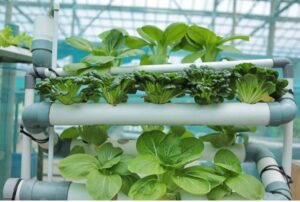Climate change refers to long-term shifts in temperatures and weather patterns. These shifts may be natural, such as through variations in the solar cycle. But since the 1800s, human activities have been the main driver of climate change, primarily due to burning fossil fuels like coal, oil and gas.
Burning fossil fuels generates greenhouse gas emissions that act like a blanket wrapped around the Earth, trapping the sun’s heat and raising temperatures. Examples of greenhouse gas emissions that are causing climate change include carbon dioxide and methane. These come from using gasoline for driving a car or coal for heating a building, for example. Clearing land and forests can also release carbon dioxide. Landfills for garbage are a major source of methane emissions. Energy, industry, transport, buildings, agriculture and land use are among the main emitters.
Climate change can affect our health, ability to grow food, housing, safety and work. Some of us are already more vulnerable to climate impacts, such as people living in small island nations and other developing countries. Conditions like sea-level rise and saltwater intrusion have advanced to the point where whole communities have had to relocate, and protracted droughts are putting people at risk of famine. In the future, the number of “climate refugees” is expected to rise.
Indian culture has always given importance to Sustainability and Environment Conservation. The Aranakayas (ancient texts), mention the importance of Forests. Forests help in soil, biodiversity and wildlife conservation. They acts as Carbon Sinks and works against Climate Change naturally. They provide livelihood and habitat to tribal people. Several communities such as Bishnois and Jasnathis practice Forest and wildlife conservation very seriously since centuries.

Forests also support endangered animal population such as Tiger which indirectly helps in generation of Eco Tourism opportunities. Fishing, fuel wood, timber, Fodder and grazing, Nutrient Cycling are some of other benefits of preserving Forest cover. They also help in keeping our water resources clean and pure and moderate extreme evens such as Cyclone storms, Flash floods or Droughts. Spiritual and Recreational tourism can be promoted through them which can give a great boost to our economy.
Talking about the modern times, with increasing population, problems like pollution and unsustainable practices of waste management are also increasing. We must go back to our roots and follow simple methods of living like composting our bio-degradable waste, using cloth bags, planting trees, rain water harvesting etc. Green fashion must be promoted instead of fast fashion and consumerism. We need to revive old conservation set ups like Bawadis, less use of pesticides and using cow dung as manure, which gradually should take up pace. As government has introduced new schemes in the budget 2023-24 such PRANAAM & GOBARDHAN which supports the above said things for farming methods.
Other than these concepts, we have Permaculture, Aquaponics, Hydroponics and methods like Crop Rotation, Zero Tillage and Intercropping, which promotes zero waste and efficient use of resources. But all these practices should be taken early and seriously, otherwise it will be too late.

